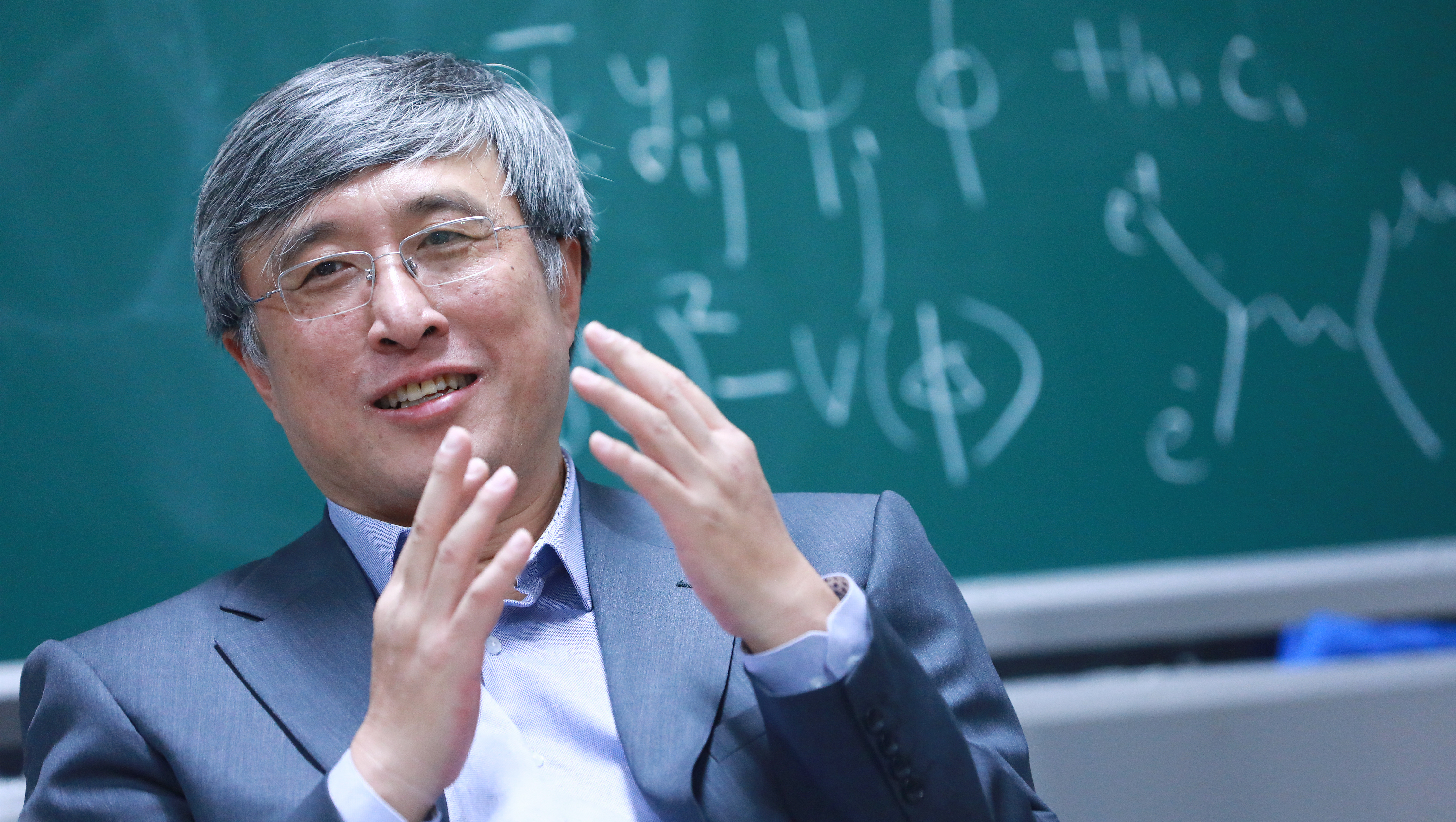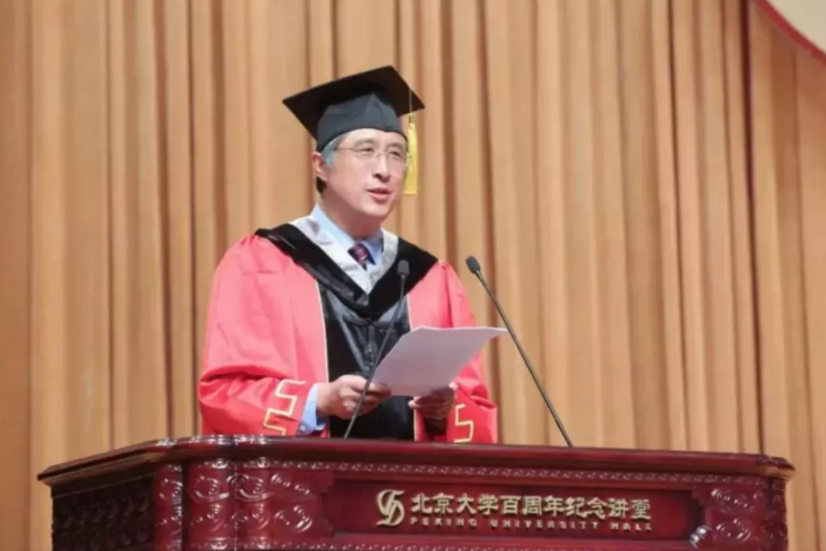[New Academicians 2019] Gao Yuanning: Solving the intricate with a simple heart
Jan 08, 2020
Editor's Note: In November 2019, a total of seven academics from Peking University were elected as academicians, with five becoming members of the Chinese Academy of Sciences (CAS) and two being members of the Chinese Academy of Engineering (CAE). This article is the fifth installment in a five-part series featuring the academic career and research achievements of these newly elected academicians.
Peking University, Jan. 8, 2020: On November 22, 2019, Professor Gao Yuanning, dean of the School of Physics, was elected as member of Chinese Academy of Sciences (CAS) amongst 63 peers from different academic disciplines. After more than 40 years' of hard work, Gao is now a leading figure of particle physics in China and abroad.
After a decade of studying at Peking University, Gao graduated with a Ph.D. and started his work in the Institute of High Energy Chinese Academy of Sciences. Due to his excellent work at CAS, he then went to work for Royal Holloway University of London and University of Wisconsin-Madison. The experience helped him dig deeper into the realm of physics and kept him informed of the frontier of particle physics. Later, he worked at CERN (Conseil Européenn pour la Recherche Nucléaire in French and European Organization for Nuclear Research in English) and was in charge of the particle physics experiments. After returning to China, he worked as a professor and dean at Tsinghua University for 10 years, improving the research of particle physics. In 2018, Gao returned to his alma mater and succeeded his predecessor Professor Xie Xincheng in the School of Physics.
 Professor Gao Yuanning
Professor Gao Yuanning
A childhood dreamer, now a mountain climber
Born in the 1960s, Gao was raised in an era of truth. At that time, given the need of China, generations of researchers and scholars attempted to contribute to the research of physics, which was considered as the key to nuclear security. Gao was inspired by figures such as Qian Sanqiang and Deng Jiaxian. Amazed at the successful launch of Dongfanghong 1, Gao dreamed of his "star trek voyage" at a very young age. Four decades later, "physics" became his first academic choice, which required a relatively high academic score.
Forty years later, Gao still remains his original passion for physics and continues to push the boundaries of human cognition by dividing the undividable innovatively. He says, "To understand particle physics, you'd better use your imagination. Imagine particles like molecules, atoms, quarks as the bricks that construct the whole world. In order to understand the origin of the world, it is necessary to dissolve what seems invisible to something visible and what is unintelligible to something intelligible."
Now approaching 60 years old, Gao has a clearer understanding of his lifelong work. He compares the path to truth as the process of climbing a mountain from the summit of which one sees a beautiful view. Some would argue that although the view at the summit is beautiful, they would prefer to continue climbing. However, Gao is not one of them. Gao quotes Liu Cixin, the first Chinese Hugo Award winner, that the ambition and curiosity to explore the unknown is what makes us human, without which the future would be hopeless. Those who study science, especially physics, should be adamant and never be satisfied.
In addition, he notes that, unfortunately, the efforts exerted upon particle physics are ebbing due to the overemphasis on the economy and peace. This might sound irrational, but it is the truth. Furthermore, he says, “Since the research was esoteric and hard to be applied to industry, many opposing voices would emerge. Also, we did a poor job at popularizing our work and promoting its benefits. Still, the domestic environment is favorable thanks to China’s persistence in supporting physics. China can gradually reach the leading position in particle physics, and it will in turn contribute to the great national rejuvenation."
A PUKer, more than a PKUer
When asked about his study at Peking University, Gao grins with his eyes sparkling. He replies, "Peking University reshaped me." As to his deepest impression of his golden years, he replies, “I got in touch with PKU's tradition of freedom on the first day on campus. I was led to my dorm by a senior student. No one told me what to do next. But after working with my roommates, a timetable was figured out and pinned on the door. Since then I learned how to manage spare time and make my own calls. Moreover, the 80s was a time for thought exchange.” Gao benefited from the freedom, as well as his occasional discussions with his roommates on popular topics such as market economy and rural reform. This transformed his way of thinking to an independent one.
Like many other PKUers, Gao had also fought with the heavy workload. While reflecting on one of his classroom experiences, he describes one of his professors as amiable and gentle. He was also inspired by the older generation of professors such as Huang Kun, who helped Gao maintain true to his original aspiration.
After many years away from PKU, Gao returned with a new title as the dean of the School of Physics. When asked why coming back, his answer is quite simple—because the university needs me.
As a young scholar, Gao decided not to follow his teachers’ advice. His first task was to assign every freshmen class a head teacher, whose major job was to help the freshmen get through the incipient state of loss. In addition, he reduced the amount of homework and increased the amount of opportunities for students to explore the world of physics, which he believes is vital for their development.
Furthermore, he mentions that China has the largest number of students who major in science and technology and they are on average younger. On the future of physics in China, he argues, “First, the priority should be given to making a bigger plan, covering 20 to 30 years ahead, including building a large particle collider. Only by doing so can China seize the moment to bridge the gap with the developed countries. Second, the older generation should give more opportunities to the young, who are the future of Chinese physics.
Gao speaking at the graduation ceremony of PKU's School of Physics in 2019
An intricate job, a simple heart
Gao is an individual with a simple and open heart. Talking about his work ethic, Gao said, “I just did it, without thinking too much, not the suffering alongside, nor the reputation afterwards. It is just my job, and I don’t hate it.”
In addition, he expresses his understanding of the loss of the younger generation, “the only problem is they have too many choices and they are not accustomed to this. Unlike the older generation, the younger generation is continuously given and occupied by an explosive amount of information”. When asked to share his secrets of success, he replies, “Don’t be obsessed with choosing, think about it once or twice then put it into practice at once. Sometimes your instinct is the best source for guidance to determine what you really what. If you cannot make up your mind, then maybe flip a coin? Men are susceptible to regret whatever they choose, so why bother?”
Being an academician is a prestigious honor in China. However, an ancient Chinese poem wrote, “the reason why one cannot perceive the true face of Mountain Lushan is simply because you are in it.” And Professor Gao is “above” Mountain Lushan. Gao’s major findings in the field of physics continue to motivate him, as he ends the interview with a reflection about himself, “in the past, maybe I could pluck up enough courage to admit my lack of knowledge since I was nobody. But now, I am an academician, who represents erudite. If someone like that acknowledges his fault, then who has the authority to judge him?”
Simplicity is one word that can be used to describe professor Gao’s career path. As the ancient philosophers Laozi and Zhuangzi said, “He could discover the essence of everyday life, with just the simplest method, of perseverance and curiosity”.
Written by: Liu Zhenwei
Edited by: Kairun Daikoku, Yan Shengnan
Photo credit to: Wang Tiantian

